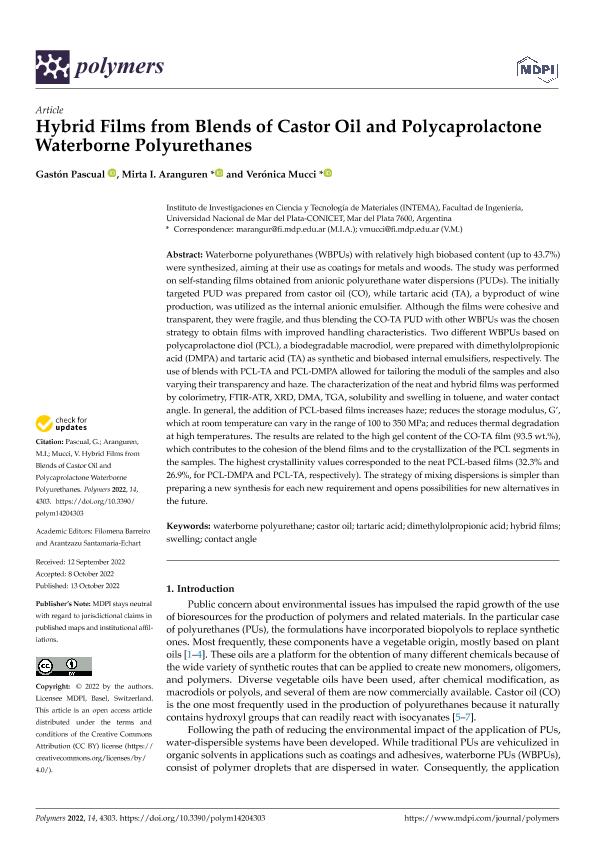Mostrar el registro sencillo del ítem
dc.contributor.author
Pascual, Gastón Mario

dc.contributor.author
Aranguren, Mirta Ines

dc.contributor.author
Mucci, Veronica Lujan

dc.date.available
2023-09-19T13:44:39Z
dc.date.issued
2022-10
dc.identifier.citation
Pascual, Gastón Mario; Aranguren, Mirta Ines; Mucci, Veronica Lujan; Hybrid Films from Blends of Castor Oil and Polycaprolactone Waterborne Polyurethanes; Multidisciplinary Digital Publishing Institute; Polymers; 14; 20; 10-2022; 1-18
dc.identifier.issn
2073-4360
dc.identifier.uri
http://hdl.handle.net/11336/212029
dc.description.abstract
Waterborne polyurethanes (WBPUs) with relatively high biobased content (up to 43.7%) were synthesized, aiming at their use as coatings for metals and woods. The study was performed on self-standing films obtained from anionic polyurethane water dispersions (PUDs). The initially targeted PUD was prepared from castor oil (CO), while tartaric acid (TA), a byproduct of wine production, was utilized as the internal anionic emulsifier. Although the films were cohesive and transparent, they were fragile, and thus blending the CO-TA PUD with other WBPUs was the chosen strategy to obtain films with improved handling characteristics. Two different WBPUs based on polycaprolactone diol (PCL), a biodegradable macrodiol, were prepared with dimethylolpropionic acid (DMPA) and tartaric acid (TA) as synthetic and biobased internal emulsifiers, respectively. The use of blends with PCL-TA and PCL-DMPA allowed for tailoring the moduli of the samples and also varying their transparency and haze. The characterization of the neat and hybrid films was performed by colorimetry, FTIR-ATR, XRD, DMA, TGA, solubility and swelling in toluene, and water contact angle. In general, the addition of PCL-based films increases haze; reduces the storage modulus, G’, which at room temperature can vary in the range of 100 to 350 MPa; and reduces thermal degradation at high temperatures. The results are related to the high gel content of the CO-TA film (93.5 wt.%), which contributes to the cohesion of the blend films and to the crystallization of the PCL segments in the samples. The highest crystallinity values corresponded to the neat PCL-based films (32.3% and 26.9%, for PCL-DMPA and PCL-TA, respectively). The strategy of mixing dispersions is simpler than preparing a new synthesis for each new requirement and opens possibilities for new alternatives in the future.
dc.format
application/pdf
dc.language.iso
eng
dc.publisher
Multidisciplinary Digital Publishing Institute
dc.rights
info:eu-repo/semantics/openAccess
dc.rights.uri
https://creativecommons.org/licenses/by/2.5/ar/
dc.subject
CASTOR OIL
dc.subject
CONTACT ANGLE
dc.subject
DIMETHYLOLPROPIONIC ACID
dc.subject
HYBRID FILMS
dc.subject
SWELLING
dc.subject
TARTARIC ACID
dc.subject
WATERBORNE POLYURETHANE
dc.subject.classification
Recubrimientos y Películas

dc.subject.classification
Ingeniería de los Materiales

dc.subject.classification
INGENIERÍAS Y TECNOLOGÍAS

dc.title
Hybrid Films from Blends of Castor Oil and Polycaprolactone Waterborne Polyurethanes
dc.type
info:eu-repo/semantics/article
dc.type
info:ar-repo/semantics/artículo
dc.type
info:eu-repo/semantics/publishedVersion
dc.date.updated
2023-06-23T16:32:04Z
dc.journal.volume
14
dc.journal.number
20
dc.journal.pagination
1-18
dc.journal.pais
Suiza

dc.description.fil
Fil: Pascual, Gastón Mario. Consejo Nacional de Investigaciones Científicas y Técnicas. Centro Científico Tecnológico Conicet - Mar del Plata. Instituto de Investigaciones en Ciencia y Tecnología de Materiales. Universidad Nacional de Mar del Plata. Facultad de Ingeniería. Instituto de Investigaciones en Ciencia y Tecnología de Materiales; Argentina
dc.description.fil
Fil: Aranguren, Mirta Ines. Consejo Nacional de Investigaciones Científicas y Técnicas. Centro Científico Tecnológico Conicet - Mar del Plata. Instituto de Investigaciones en Ciencia y Tecnología de Materiales. Universidad Nacional de Mar del Plata. Facultad de Ingeniería. Instituto de Investigaciones en Ciencia y Tecnología de Materiales; Argentina
dc.description.fil
Fil: Mucci, Veronica Lujan. Consejo Nacional de Investigaciones Científicas y Técnicas. Centro Científico Tecnológico Conicet - Mar del Plata. Instituto de Investigaciones en Ciencia y Tecnología de Materiales. Universidad Nacional de Mar del Plata. Facultad de Ingeniería. Instituto de Investigaciones en Ciencia y Tecnología de Materiales; Argentina
dc.journal.title
Polymers
dc.relation.alternativeid
info:eu-repo/semantics/altIdentifier/url/https://www.mdpi.com/2073-4360/14/20/4303
dc.relation.alternativeid
info:eu-repo/semantics/altIdentifier/doi/http://dx.doi.org/10.3390/polym14204303
Archivos asociados
